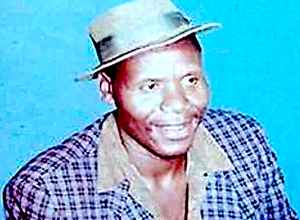
Solomon Skuza
Solomon Skuza was a freedom fighter who emerged from Zimbabwe’s protracted war of liberation to become one of the most popular musicians after the attainment of independence in 1980. In addition to his native Kalanga he wrote lyrics in Ndebele Shona and English as well.
Born on 13 December, 1954 in Plumtree in the southern part of Rhodesia Solomon Skuza went into exile in Zambia to join the Zimbabwe People’s Revolutionary Army (ZIPRA). Skuza played in the ZIPRA band and entertained guerrillas at ZIPRA camps. He later became the band leader and an official composer for the ZIPRA Entertainment Corps.
In 1980, Skuza returned to Zimbabwe and produced a hit single, Banolila, which sold over 75,000 copies a remarkable achievement in the early days of independence. He named his band Fallen Heroes in reference to the fact that the band was largely composed of comrades who had become incapacitated to participate in the war front because of enemy assaults. It was also a tribute to those who had fallen as a result of the war.
His 1990 Reggae hit album, Love and Scandals was a commercial and critical success, due to its political content regarding the Willogate Scandal which took place between 1988 and 1989.
The scam which was exposed by the local newspaper the Chronicle involved government officials especially Ministers buying vehicles at subsidized prices from Willovale Car Assembly Plant in Harare and reselling them at exorbitant prices to other Zimbabweans
The resultant commission of inquiry set up by the government to investigate the scandal claimed the life of Maurice Nyagumbo who resigned from his ministerial post and later committed suicide for fear of the repercussions. Other ministers who were singled out by the Sandura commission included Calistus Ndlovu and Enos Nkala who found themselves without their ministerial posts.
It is this Sandura Commission that Skuza refers to in the lyrics “did you hear the news” and “the information has been leaking so far.” Skuza goes on to say “the cost of living is still too high” which dramatizes how he finds it difficult to reconcile the poverty that the ordinary person lives in and the opulence that those in power swim in.
The song reminds society of the abandoned principles of war of liberation that ought to be the guiding philosophy of post-independence. In one song, he asks, “how can someone buy a car and sell it again?” In another, he sings of his lover leaving him for “a guy who owns a Cressida”, referring to the Toyota Cressidas assembled at Willowvale. It was this album that earned him the nickname “Jah Solo.
In 1990 he did a soundtrack, Patimile for the Zimbabwean film Jit Jit is a Zimbabwean-made film directed by Michael Raeburn Much of the film is set in the beer garden at the Queens Hotel in Harare, which at the time was the epicenter of the style of popular Zimbabwean dance music called jit also known as jit-jive.
Solomon was shot during the war which is why he could not dance during his performances.
Solomon Skuza should be credited for singing about pertinent and grave political issues that affected the ordinary person.
Although some musicians from his home region have tried to follow his footsteps Skuza still remains the most popular artist to come out of Kalanga speaking district of Matabeleland
His hit song “Banolila” remains a hit at weddings and parties.
Solomon died at his uncle’s house in Bulawayo high density suburb in 1995
Chase Skuza young brother to Solomon, said his brother was one of the musicians from the Matabeleland region who penned songs with strong revolutionary lyrics. He said some of the songs were composed before independence although he continued reminding the people about the liberation struggle.
Songs like “Kambe yibolaba” “Salibonani maZimbabwe” “Ndangariro” “Makumalo” were some of the songs that come to mind when one talks of Solomon Skuza.
Chase said the songs were partly inspired by the war experiences.
Renowned poet and musician Albert Nyathi said people who stand out for their contribution to the struggle are Solomon Skuza, Marko Sibanda and Cde Chinx Chingaira
“The gun alone was not enough for it does not speak. Music, thus played an important role in inspiring the comrades during the struggle.It made people understand what they were fighting for and why they were fighting.”
Ends…….